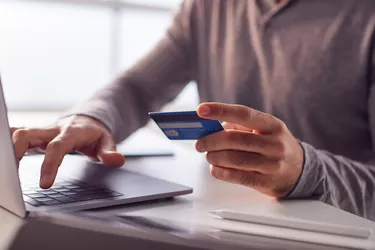
It's a good idea to change your debit card's personal identification number, or PIN, if you suspect that it has been compromised. A new PIN will prevent the unauthorized use of your card and thus protect your account. While each bank has its own procedures that govern how you can obtain a new PIN, most banks allow you to change your debit card PIN in at least four different ways.
Read More: How to Change the PIN on a Credit Card
Video of the Day
Video of the Day
Online or Mobile App
It's possible to change your PIN using your bank's mobile app or online banking website. This feature is often located in the customer service or self-serve area. Typically, you'll need to log in to your account and specify that you want to make a change, then follow the prompts to do so. Changing your PIN online or with a mobile app requires you to remember your current PIN, so be prepared to provide it.
Read More: What Can I Do if I Lost My Debit Card PIN Number?
Over the Phone
Sometimes, when changing your PIN over the phone, you will speak to a person at your bank. Other times, you may find yourself changing your PIN using an automated system. If you know your old PIN, the automated system will generally allow you to change your PIN on the spot.
If you don't know your PIN, or if you speak to a representative, the bank will likely opt to mail your new PIN to the address they have on file for you. Bank customer service reps aren't allowed to tell you your new PIN over the phone for security reasons (and may not even be able to see it), which is why it needs to be mailed to you.
Read More: How to Change the PIN Number on an ATM Card
At the Bank
Many banks will let you bring your debit card into the branch to change your PIN using a simple debit card programming machine. One advantage of this method is that it allows you to make the change on the spot. Plus, you get to pick the PIN you want.
While it's easiest to do this if you know your current PIN, going to the bank in person is also your best option if you have forgotten your PIN. Bring identification, and once a bank teller verifies your identity, they will allow you to change the PIN.
Choose a PIN you'll remember using some sort of memory trick, but not something easy for someone else, such as your birthday.
At an ATM
Many banks allow you to change your PIN at any ATM. This method is convenient, since you don't need to go into the branch or navigate your way through the website to make the change. You'll need your current PIN to do it, but the ATM can program your new number immediately.
The option to change your PIN is most likely going to be found under a sub-menu with the name "More Options" or "More," and not in the main ATM menu. Once you've changed your PIN, try it out before you leave to make sure you did it correctly. This will require you to end your session, then start a completely new transaction. You won't have to complete a transaction (such as withdrawing more money), but once the machine accepts your pin, you'll know you've done it correctly and you can cancel the transaction.